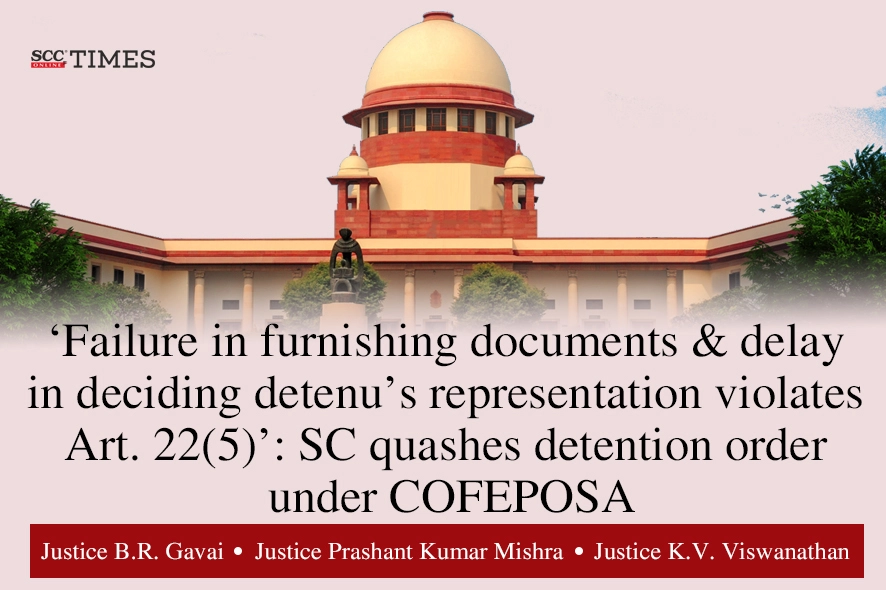Supreme Court: In a criminal appeal by the detenu’s wife against the Kerala High Court’s decision, whereby the appellant wife’s habeas corpus petition for production of the detenu, who was detained for the offences under the Conservation of Foreign Exchange and Prevention of Smuggling Activities Act, 1974, the three Judge Bench of BR Gavai*, Prashant Kumar Mishra and KV Viswanathan, JJ., quashed and set aside the judgment and order of the High Court and also the order passed by the Joint Secretary (COFEPOSA). The order passed by the Under Secretary, Government of India confirming the detention order of the detenu was also quashed and set aside and the detenu was directed to be released forthwith.
Factual Matrix
The detention order dated 31-08-2023 was passed by the Detaining Authority under Section 3(1) of the COFEPOSA, thereby directing detention of the detenu to prevent him from acting in any manner prejudicial to the augmentation of foreign exchange in future.
The detenu was taken into custody on 02-09-2023
Vide order dated 31-07-2024, the Court allowed the present appeal; quashed and set aside the impugned judgment and order of the High Court, and the order passed by the Joint Secretary (COFEPOSA) which confirmed the detention order of the detenu.
Grounds for challenge to the detention order
1. Whether the non-supply of the statements of A, which were relied upon by the Detaining Authority while arriving at its subjective satisfaction affected the right of the detenu to make an effective representation under Article 22(5) of the Constitution of India?
Referring to the catena of judgments, the Court noted that in unequivocal terms, it has been held that the constitutional requirements under Article 22(5) of the Constitution of India are twofold:
(1) the Detaining Authority must, as soon as practicable after the detention communicate to the detenu the grounds on which the order of detention has been made, and
(2) the Detaining Authority must afford the detenu the earliest opportunity of making the representation against the order of detention. The Court also noted that it has been recorded that the right is to make an effective representation and when some documents are referred to or relied on in the grounds of detention, without copies of such documents, the grounds of detention would not be complete. The Court also noted that it has been laid down that it is immaterial whether the detenu already knew about their contents or not.
Hence, the Court reiterated that the detenu has the right to be furnished with the grounds of detention along with the documents so-referred to or relied on and failure or delay in furnishing those documents would amount to denial of the right to make an effective representation.
Further, the Court while clarifying the said stand, reiterated that it is not necessary to furnish copies of every document to which a casual or passing reference may be made and which are not relied upon by the Detaining Authority in making the order of detention. However, failure to furnish copies of such document/documents, relied on by the Detaining Authority which would deprive the detenu of making effective representation would certainly amount to a violation of the fundamental right guaranteed under Article 22(5) of the Constitution.
While examining the grounds for detention order in the instant matter, which led the detaining authority to arrive at its subjective satisfaction that the detenu was engaged in activities which adversely affected the augmentation of foreign exchange resources of the country.
The Court on perusal of A’s statements and upon noting that B’s statements were also taken into consideration by the detaining authority, which also established that A was a vital link for transactions between B and the detenu, said that A’s statements were ‘not just a casual or a passing reference’. On the contrary, the said statements formed the basis for arriving at a subjective satisfaction by the detaining authority.
The Court also clarified the distinction between the ‘detention order passed on various grounds’ and the ‘detention order passed on one ground relying on various materials’, saying that if the detention order is passed on one ground taking into consideration factual aspects, the question would be as to whether non-supply of the material containing the factual aspects relied on by the detaining authority would vitiate the detention order or not.
Answering the question that, though the grounds of detention could be severed, whether the materials which have been relied on by the detaining authority for arriving at its subjective satisfaction could also be severed, the Court opined that the documents forming the basis of the material facts, relied on by the authority and taken into consideration to form a chain of events could not be severed, and the High Court was not justified in coming to a finding that despite eschewing certain material taken into consideration by the authority, the detention order could be sustained by holding that the authority would have arrived at such a subjective satisfaction even without such material.
Therefore, the Court concluded the answer to issue (1) in affirmative, holding that non-supply of the statements of A, affected the right of the detenu to make an effective representation under Article 22(5) of the Constitution, hence, the detention was vitiated on the said ground.
2. Whether non-receipt of the representation and the delay in deciding the representation by the Detaining Authority and the Central Government would also affect the right of the detenu under Article 22(5) of the Constitution?
The Court noted that the detenu had made representations on 27-09-2023, addressed to the detaining Authority, Central Government and the Advisory Board. The jail authorities had merely forwarded the representations through ordinary post. These representations neither reached the detaining Authority nor the Central Government and since these representations were sent by ordinary post, they also could not be tracked. It was only after the issuance of the notice by this Court in the present matter, that the ground regarding non-disposal of the representations of the detenu came to the notice of the Authorities concerned. When the representations were received from the Jail Authorities, the same was placed before the Authorities, which were rejected on 11-06-2024 and 12-06-2024 respectively.
Hence, the Court noted that detenu’s representations dated 27-09-2023 came to be rejected by the detaining Authority and the Central Government on 11-06-2024 and 12-06-2024 respectively i.e. after almost nine months from the date of making the same. Assessing the question of delay, the Court referred to Tara Chand v. State of Rajasthan (1981) 1 SCC 416, wherein it was held that the delay of one month and five days in communicating the detenu’s representation from the jail to the detaining authority demonstrated gross negligence and extreme callousness. Referring to another authority which dealt with a similar question of delay, the Court noted that it has been held in unequivocal terms, that the intermediary authorities who are communicating authorities are also required to move with an amount of promptitude so that the statutory guarantee of affording earliest opportunity of making the representation and the same reaching the Government is translated into action.
In the matter at hand, the Court stated that the Superintendent of the Central Prison and Correctional Home had acted in a thoroughly callous and casual manner. Despite there being catena of judgments by this Court that the transmitting authorities must transmit the representation of the detenu promptly and it is the corresponding duty of the authorities concerned to consider the said representation and to decide it swiftly, the same has been breached in the present matter. The Court also disapproved of the practice of the Jail Authorities in dealing with the valuable right of the detenu in such a casual manner.
The law laid down in Vijay Kumar v. State of J&K, (1982) 2 SCC 43 that the State Government must gear up its machinery to ensure that the representation is transmitted quickly; it reaches the Central Government as quickly as possible and is decided expeditiously, was given a go-bye, in the matter at hand. The Court added that the Jail Authorities ought to have ensured that the representation of the detenu reaches the Authorities at the earliest and in this era of technological advancement, the Jail Authorities could have very well sent copies of the representation to the Detaining/Appropriate Authority either by email or at least a physical copy could have been sent by Speed Post, so that there could have been some evidence of the said being sent to the competent authority and could have been tracked. Further, the competent Authority should decide such representation with utmost expedition so that the valuable right under Article 22(5) of the Constitution is not denied. Thence, on account of casual, callous and negligent approach of the Jail Authorities, the Court concluded that there was a delay of about nine months in deciding the representation, even otherwise, if the stand of the respondents as made in the counter affidavit would have been accepted, there has been a delay of 27/20 days on the part of the Central Government and the detaining Authority in deciding the representation. Thus, the Court held that the detention order was liable to be quashed and set aside on this ground also.
CASE DETAILS
|
Citation: Appellants : Respondents : |
Advocates who appeared in this case For Petitioner(s): For Respondent(s): |
CORAM :











Saja se pahle Rai poochhi jaaye Desh ke liye aap kya karna chahte ho aur kaise jioge Sarkar ke dayre mein hona chahie Sara kuchh